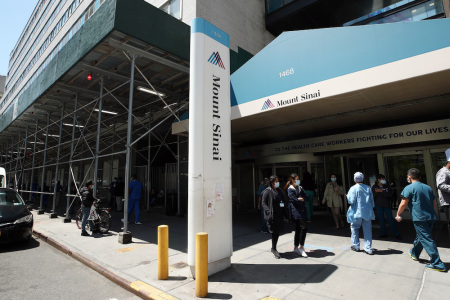People deficient in vitamin D 54% more likely to get COVID-19: study

People with a vitamin D deficiency are 54% more likely to test positive for the new coronavirus. Members of predominantly black and Hispanic communities have been found to be most at risk, according to a new study.
The study, SARS-CoV-2 positivity rates associated with circulating 25-hydroxyvitamin D levels, published in the journal PLOS ONE, was conducted by Dr. Michael Holick, professor of medicine, physiology and biophysics at Boston University School of Medicine and a team of researchers from the clinical laboratory Quest Diagnostics.
Holick and his team examined 190,000 blood samples from coronavirus tests performed March 9 through June 19 collected in all 50 states and the District of Columbia. They found that the vitamin D deficient samples had 54% higher COVID positivity compared to those with adequate levels of vitamin D. And people of color were particularly deficient of the sunshine vitamin, the study found.
“We evaluated more than 190,000 blood samples from patients of all ethnicities and ages infected with COVID in all 50 states. We observed that the higher that the patient’s blood level of 25-hydroxyvitamin D was, up to 55 ng/mL [the] lower was their risk of being infected with the coronavirus. People of color have been particularly affected by COVID 19,” Dr. Holick noted in a statement from The Boston University School of Medicine.

“We found that patients living in predominantly African-American and Hispanic zip codes were more likely to be vitamin D deficient and have a higher risk of acquiring the infection,” he added.
Vitamin D deficiency, according to data cited by the Endocrine Society, is very common in all age groups as few foods contain it. While the skin produces it using sunlight, many people aren’t able to generate enough of it to meet the recommended serum 25-hydroxyvitamin D level, particularly during the winter months, Holick said in an interview with the Boston Herald. Fair-skinned individuals and those who are younger also tend to convert sunshine into vitamin D far better than those who are darker-skinned and over age 50, according to the Cleveland Clinic.
The Endocrine Society Guidelines recommends infants, children and adults receive 400-1000 IUs, 600-1000 IUs and 1000-1500 IUs of vitamin D daily, respectively. Obese adults require 2-3 times more.
Holick told the Boston Herald that he has been taking 6,000 units of vitamin D a day for decades and is in great health.
“The higher your vitamin D status, lower was your risk (of contracting the coronavirus),” he said. “Vitamin D definitely improves your overall immunity to fight infections.”
Holick argued that while the world races to find a vaccine for the coronavirus, vitamin D can be purchased relatively cheap in drug stores.
“It’s perfectly safe,” he told the Herald. “It’s considered to be, by many, the nutrient of the decade.
“People have been looking for the magic drug or waiting for the vaccine and not looking for something this simple."





















